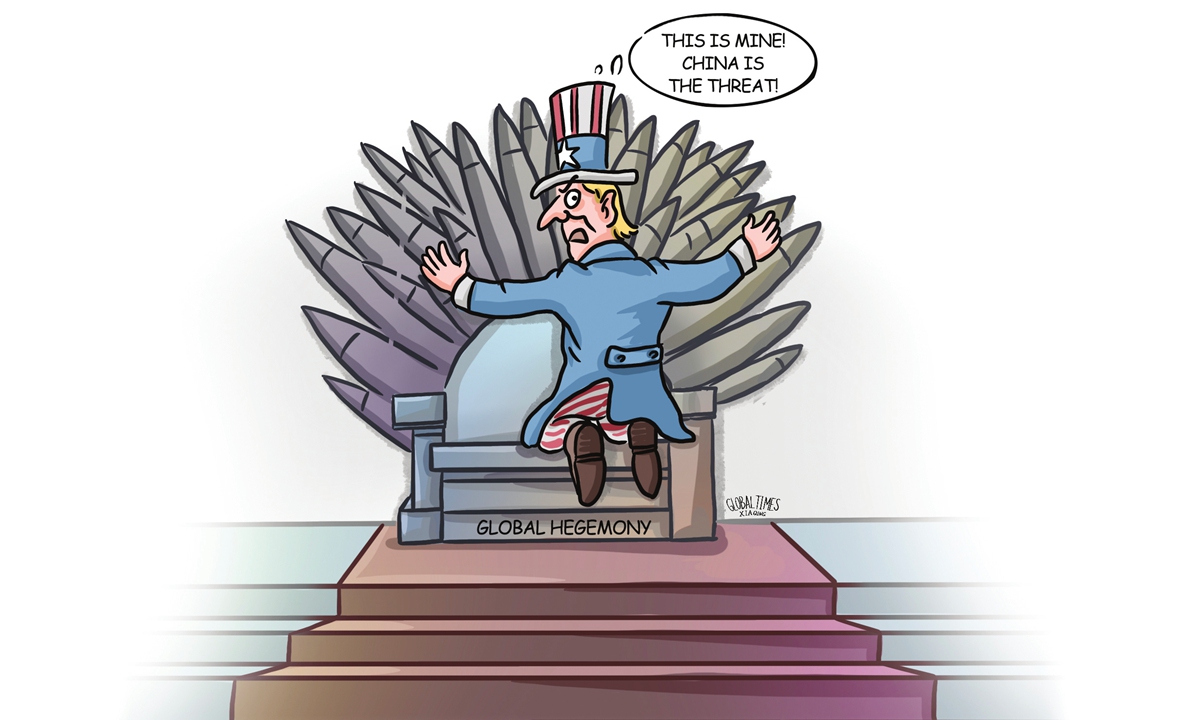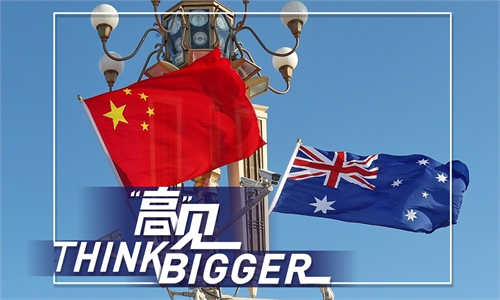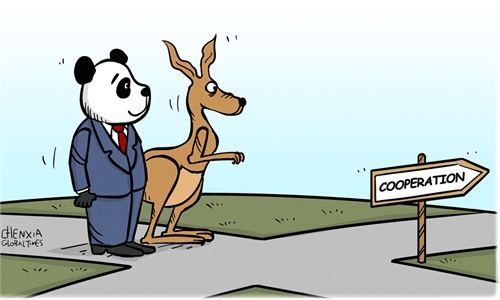Dominating the world while not making room for China is a no-win game for US: Canadian scholar

Illustration: Xia Qing/GT
Editor's Note:"I'm well aware of where China has been and where it is now. Over the past 40 years, however the West explains it or defines it, China has accomplished amazing things," Shaun Narine (Narine), a professor of International Relations and Political Science at St Thomas University (Canada), consultant of Department of Foreign Affairs of Canada, told Global Times (GT) reporter Li Aixin in a recent interview. Narine explained why the West's hostility toward China is misguided, adding that China has achieved a great deal not because China wants to supplant the West, but because China is doing it for itself.
GT: In the West, your objective perspectives stand out amid the prevailing hawkish views toward China. What are the reasons for your rational views?
Narine: I certainly have other colleagues who share some of my views, but many of us don't necessarily get much attention or have the opportunity to make our views heard.
I'm old enough to remember many different waves of various groups, individuals, and countries being demonized by the Western world over the past 50 years. I grew up during the Cold War. The Soviet Union at that time was demonized. During the 1980s, a lot of Marxist organizations in Latin America were demonized. In the 1990s, we had Iraq and Saddam Hussein demonized, then Saddam Hussein again after 2001 - not just him, but the entire Muslim world. I've seen these waves of demonization. It always involves over-simplifying what are complex situations.
When the whole situation with China began, it was a very familiar process. The media take up a particular perspective. Politicians rush to create an enemy. There's always some comparison to events of World War II.
The other thing is that a lot of people in the Western world see the West as in some way representing a moral apogee of human achievement - representing human rights, democracy, all good and positive things. I don't see it that way. A lot of the ways the Western world portrays and sees itself are based on both a very selective memory and a selective interpretation of the past and the present.
The West has achieved a great deal. But Westerners often don't want to understand or recognize what that was built on. Canada is a European settler colonial state that is built on the theft of every square inch of land from the native people of the country. The US is built on genocide and slavery. The West's accomplishment is built on a foundation of extreme violence and imperialism and colonialism. Why would the Western world possibly think that it was the good guy in the world? It's a deluded position. At the very least, the West can't teach anyone else in the world how to develop peacefully.
When I look at China, I'm well aware of where China has been and where it is now. Over the past 40 years, however the West explains it or defines it, China has accomplished amazing things. That's undeniable. If you have a grasp on reality, you've got to appreciate that whatever its problems, China has also achieved a great deal. We need to respect that and recognize that it's not necessarily something that is being done because China wants to supplant the West. It is something that China is doing for itself.
GT: You have analyzed "why the West's resentment of China is so misguided." Among the reasons you listed, what is the most important one?
Narine: The biggest one is the fear of loss of power. For the past few centuries, the Western world has been dominant. Westerners have been very comfortable with that reality. Of course, in the modern advanced technological era, the Western world prides itself both on driving and controlling it. Technical, political, economic supremacy, all of these things are essentially seen as measures and indicators of Western superiority.
The rise of China throws all of that into doubt. For the first time, people see a powerful state in Asia that is not controllable by Western powers. China is, by purchasing power parity, actually a substantially larger economy, with larger GDP, than the US, which is the first time in 100 years that any country has been bigger than the US in those terms.
GT: You said you have other colleagues who share your views. Is the number growing or decreasing?
Narine: It's a difficult question to answer. I think that we're entering what seems like a new cold war.
I was at a conference in December, which was looking into Canada's Indo-Pacific Strategy. It involved experts from around the country as well as many people in government. I seemed to be the only person raising highly critical questions. I don't want to make that sound like I was being particularly courageous or a gadfly, and there may well have been other people who agreed with me who just didn't want to say anything. But I do think that sophisticated Canadian foreign policy analysts don't take anything at face value.
We're living in a complex world and the role of China is becoming more involved and more important. We also have to balance that with the reality that we live right next door to the US. That complicates our foreign policy. You could be critical of what China is doing. You could be critical of what Canada is doing in response. But our foreign policy fits within fairly narrow parameters. A lot of people understand that and don't necessarily want to speak beyond those parameters.
GT: How closely related are China-Canada ties to the upcoming US presidential election?
Narine: I don't think whoever is president in the US is going to change Canada-China relations in a substantive way. The US is getting more and more hostile to China. It doesn't matter if you're a Democrat or Republican - as long as the US is hostile to China, it limits how far Canada can go in being friends with China.
About 85 percent of Canada's exports go to the US. We are very economically dependent on the US. And that translates into considerable political leverage the US has over Canada. The Trump administration brought in this new Canadian-Mexican-American free trade deal. In many ways, it was similar to the old NAFTA. But from the American point of view, what it did was it consolidated North America against China.
They see Mexico as being a source of cheap labor. They see Canada as being a source of readily available natural resources and all of that is supposed to feed the American economy and American development.
GT: You wrote that "China's rise signifies an emerging multipolar world. Canada's response isn't doing the country any favors." What is your advice on what Canada should consider doing?
Narine: We're really limited by the fact that geography defines so much of Canadian foreign policy and our geography is that we are a country of 40 million people next door to the US. That constrains things a lot.
To change this, we need to become less economically dependent on the US and that's obviously much easier said than done. But if we want that ability, if we want to be autonomous enough to pursue a different path with China and pursue our own interests in a multipolar world, we need to be able to diversify our economy. We need to be able to get away from simply being seen as a place that produces natural resources, what we can dig out of the ground or cut down in the forest.
We need to be able to greatly increase our knowledge-based industries, because knowledge-based industries are much less vulnerable. They're much more flexible. At the end of the day, the strength of any country relies on the power of its people, on the abilities of its people.
Again, it's easy to say, particularly when you're in a privately run economy, where business people can only be encouraged to do different things with tax breaks, incentives and subsidies. For businesses in Canada, selling to the US is just the path of least resistance. As long as that continues, our autonomy is restricted. So we're going to find the multipolar world emerges and we will be caught up in the American bloc. Whatever happens to that bloc is simply going to be our fate. I don't like that, but I don't really see an easy way out of it.
On a larger scale, I'm pretty optimistic about a rising multipolar world. At the same time, the Western world has to be willing to accept its own relative decline. That's a very difficult thing for it to do. It's a difficult thing for any hegemonic power, for any dominant power to accept its relative decline. So the US is launching economic warfare and technological warfare against China.
For the US, the problem is how to continue dominating the world while not making room for China. I don't think it can do that. That's ultimately a no-win game.


